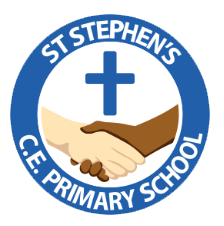Music
Overview of Music at St Stephen's
Music at St Stephen's Overview
Skills Progression overview of Music
EYFS Curriculum Documents
How we ASPIRE in Music
A – A whole school curriculum with high expectations and excellence delivered rigorously through well sequenced subjects, progression in generative knowledge, rich vocabulary, concepts and skills.
The Music curriculum has been sequenced to build upon the units in each year group and key stage and to develop learning from other subjects across the Primary curriculum. We revisit National curriculum objectives throughout the school curriculum map, in order to extend and consolidate previous knowledge. We provide the children with knowledge organisers at the start of, and to utilise throughout the topic to develop their vocabulary and aid their knowledge retrieval. Music lessons are coherently structured to ensure the strands of musical learning are part of a learning spiral. Over time, children can both develop new musical skills and concepts, and re-visit established musical skills and concepts.
S –Stimulating enquiring minds by providing rich and relevant experiences, purposeful and connected learning, and creative thinking.
Our Music curriculum is sequenced to build upon four musical areas each session: singing, listening, composing and performing. Pupils have a relevant curriculum, learning about musicians and music styles from the local area as well as culturally diverse experiences. Children learn about different elements and strands of music and build upon these in a spiral structure so their skills and understanding grow and develop. We offer the children rich and relevant experiences, such as watching live or recorded performances and taking part in performing to a larger audience in school, church and even our local Guide Bridge Theatre.
P – Placing nurturing, lifelong learning behaviours – resilience, risk taking, independence, perseverance, and pride in success - at the heart of our curriculum.
The curriculum has been structured to teach and reflect upon applicable skills which children can use in their own lives, whether in the music field or transferable across other disciplines. We encourage the children to appraise a variety of music styles to recognise their own personal preferences as well as developing appreciation for music not to their tastes. Our teaching strategy includes Rosenshine's principles and regular retrieval practice boosts independent learning and resilience. Music inspires children to persevere when preparing for a performance and ultimately to take pride in their development as they progress through the curriculum.
I – Inclusivity and flexibility which allows us to cater for individual needs, abilities and interests
All pupils are able to access our Music curriculum and teachers adapt plans where necessary to cater for individual needs. Differentiated support, task and outcome can support and challenge all learners to achieve their full potential and inspire a hunger to develop and perform to the best of their ability. Potential areas of difficulty are identified and addressed at the outset. Lessons are planned to address potential areas of difficulty and to remove barriers to pupil achievement.
R- Revisiting key knowledge, skills and vocab, so pupils know more and remember more.
Musical knowledge is revisited at the start of every lesson by using their retrieval practice. Key vocabulary is regularly reviewed and discussed. Musical notation and theory is referred to each lesson as Music lessons are taught weekly for at least an hour as outlined in the National Plan for Music Education.
E -Encompassing the Whole Child – developing their faith, values, spirituality, health and well-being, and understanding of the world we live in, their future role in our culturally diverse community and country where equality and tolerance is promoted
Our Music curriculum inspires a curiosity about the different people, faiths and cultures that express themselves through different types of music. Christian values are embedded in our curriculum, particularly respect, thankfulness and trust. An appreciation of music inspires our children to reflect on their own spirituality and well-being as they identify forms of musical expression that they align with and helps them articulate their understanding of their lived experience.
Music at St. Stephen's in Action......

